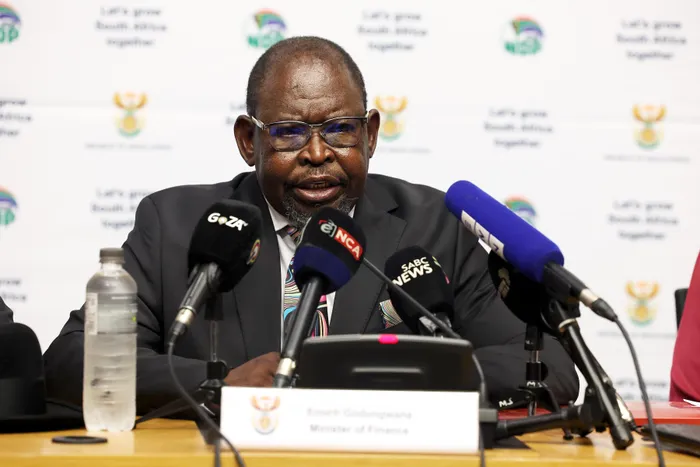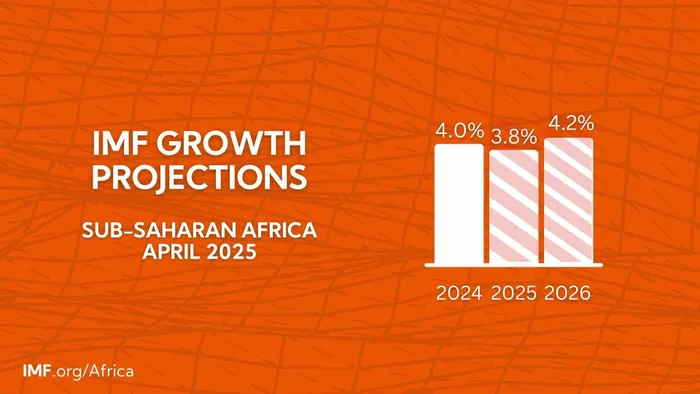IMF warns Sub-Saharan Africa is grappling with external headwinds as growth projections dim
ECONOMY

Budget 2025 The IMF warning comes as South Africa is grappling with revenue-raising measures after the Finance Minister Enoch Godongwana last week reversed his proposal to raise the value-added tax by 0.5 percentage points from 15% to 15.5% in a bid to raise R58 billion to plug the revenue shortfall.
Image: Jairus Mmutle/GCIS
The International Monetary Fund (IMF) has warned that the spectre of escalating trade tensions, combined with rising financial costs in developed economies, will complicate the economic landscape for sub-Saharan Africa.
IMF director of the African Department, Abebe Selassie, said on Friday the sentiment surrounding sub-Saharan Africa was cautiously optimistic six months ago, marked by the region's gradual recovery from the economic repercussions of past global upheavals.
However, Selassie said a new wave of global policy uncertainty has emerged, posing serious threats to this fragile recovery just as policymakers began to see the fruits of their hard work.
He said recent forecasts projected regional growth at a robust rate exceeding expectations, particularly for 2024 but external forces have made their presence felt just as some stability began to materialise.
“Any further increase in trade tensions or tightening of financial conditions in advanced economies could further dampen regional confidence, raise borrowing costs, and delay investment,” Selassie said.
“These external headwinds come on top of longer-standing vulnerabilities. High debt levels constrain the ability of many countries to finance essential services and development priorities. While inflationary pressures have moderated at the regional level, quite a number of countries are still grappling with elevated inflation, necessitating a tight monetary stance and careful fiscal policy.”
The IMF warning comes as South Africa is grappling with revenue-raising measures after the Finance Minister Enoch Godongwana last week reversed his proposal to raise the value-added tax by 0.5 percentage points from 15% to 15.5% in a bid to raise R58 billion to plug the revenue shortfall.
Selassie said the governments in the region had made important investment in infrastructure needs with positive outcomes over the last decade, but the returns of these investments had not been captured in tax revenue, and debt loans have gone up and interest to revenue ratio had risen.
“Going forward I think it is very clear that to be able to continue investing, governments have to find more ways other than borrowing to address this. In the past, governments have been quick to cut spending but this has been found to be detrimental to developmental progress and growth outcomes,” Selassie said.
“We'd very much like for countries to avoid this, and when there are pressing spending needs, there are generally only a couole of ways you can finance this: spending cuts or revenue mobilisation. You can borrow, of course, but borrowing is not optimal.
"This doesn't mean that reveune mobilisation is easy. Far from it. It requires not only the political engagement but also a lot of communication and an effort to show that the resources the government is trying to generate are going to go to the right areas to help strengthen the social contract.
"On South Africa, when issues like these arise, these are deeply domestic political issues to resolve as to what is the best way to do the financing is. If a tax rate increase for a particular tax is not possible, then maybe finding ways to expand the tax base, maybe try a different tax, and maybe if all those are not possible try maybe revisiting spending priorities to handle this."
The IMF has calibrated its growth expectations, with a notable decline anticipated as sub-Saharan Africa’s growth is forecasted to ease to 3.8% in 2025 and 4.2% in 2026.

The IMF has calibrated its growth expectations, with a notable decline anticipated as sub-Saharan Africa’s growth is forecasted to ease to 3.8% in 2025 and 4.2% in 2026.
Image: Supplied
These figures represent a stark downgrade from previous estimates made in October, largely attributed to external challenges such as diminished global demand, softer commodity prices, and tighter financial markets.
Against this challenging backdrop, the IMF’s World Economic Outlook report underscored the importance of calibrating policies to balance growth, social development, and macroeconomic stability.
Selassie said building robust fiscal and external buffers was more important than ever, underpinned by credibility and consistency in policymaking.
In particular, Selassie said there was a premium on policies to strengthen resilience: mobilize domestic revenue, improve spending efficiency, and strengthen public financial management and fiscal frameworks to lower borrowing costs.
He said reforms that enhance governance, improve the business climate, and foster regional trade integration are also needed to lay the groundwork for private sector–led growth.
Selassie said high growth was imperative to engender the millions of jobs that are needed. “A strong, stable, and prosperous sub-Saharan Africa is important for its people but also the world. It is the region that will be the main source of labor and incremental investment and consumption demand in the decades to come,” Selassie said.
“External support as the region goes through its demographic transition is of tremendous strategic importance for future global prosperity.”
BUSINESS REPORT